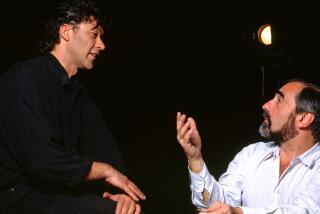Lyn Murray; Wrote Scores for Films, TV
- Share via
Lyn Murray, a prolific writer of scores for radio, films and television who began his Broadway career as choral arranger for Irving Berlin’s “This Is the Army,” died Saturday of cancer.
The Emmy Award-winning composer and conductor (for “Miraculous Machines,” a 1986 National Geographic Special), was 79 and died at Cedars-Sinai Medical Center.
Murray, who attended the Juilliard School and studied with Joseph Schillinger, began as a staff conductor, composer and arranger for Philadelphia radio stations before joining the CBS network in 1934. That proved to be a 13-year relationship in which he did music for such dramatic radio shows as “The Adventures of Ellery Queen,” “Radio Readers Digest,” “March of Time,” “The Ford Theater” and “26 by (Norman) Corwin.”
During the 1930s, ‘40s and ‘50s his Lyn Murray Singers were featured on the “Hit Parade” show.
Besides Berlin’s tribute to soldiering, Murray’s other Broadway credits include the choral music for “Panama Hattie,” “Let’s Face It” and “Finian’s Rainbow.”
His film scores include “The Prowler,” “Son of Paleface,” “Here Come the Girls,” “The Bridges at Toko Ri” and “To Catch a Thief.” His music was heard on such television series as “General Electric Theatre,” “Alfred Hitchcock,” “Mr. Novak,” “Dr. Kildare” and many documentaries, particularly “Carl Sandburg’s Lincoln.”
He also provided the musical interludes for “Steambath,” the highly regarded PBS drama, as well as “Incident at Vichy,” “Requiem for a Nun” and “The Last of Mrs. Lincoln.” In 1974 he was nominated for an Emmy for “Struggle for Survival” on NBC.
In the last few years he composed and conducted for the California Artists Radio Theater, a group of former radio performers. One of those programs will be broadcast Sunday at 8 p.m. on KUSC-FM.
Murray, a founder of the Screen Composer’s Guild and board member of the National Academy of Music, also conducted and arranged for several Decca Records stars, among them Bing Crosby and Louis Armstrong.
More to Read
Only good movies
Get the Indie Focus newsletter, Mark Olsen's weekly guide to the world of cinema.
You may occasionally receive promotional content from the Los Angeles Times.










